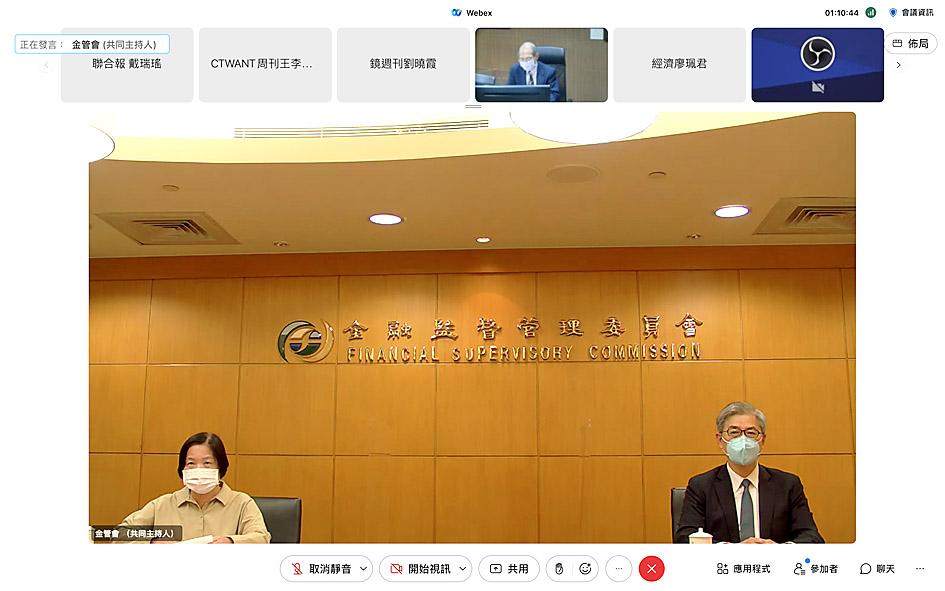Life insurance and property insurance companies yesterday agreed to accept a digital virus certificate for insurance claims instead of a doctor’s diagnosis to avoid further burdening hospitals, they said in separate statements.
The Non-life Insurance Association of the ROC (產險公會) said in a statement that its members are considering accepting policyholders using digital certificates rather than doctors’ COVID-19 diagnoses to file insurance claims.
However, the association said that individual property insurers still have the right to decide whether to compensate policyholders according to its insurance terms and based on individual cases, it said.

Photo: Kao Shih-ching, Taipei Times
The Life Insurance Association (壽險公會) said in a separate statement that its members have agreed to accept the digital certificates for insurance claims, along with the right to examine the authenticity of policyholders’ certificates, it said in a separate statement.
Digital virus certificates would be updated with a QR code with which property insurers could examine the policyholder’s information on a government Web site to check whether it is consistent with the information on the certificate so that insurers do not need to worry about forgery, Insurance Bureau Director-General Shih Chiung-hwa (施瓊華) told an online news conference.
While insurers on Monday said that one of the reasons they prefer doctors’ diagnoses is that they can resolve disputes directly with physicians, Shih said that insurers could ask policyholders to authorize them to examine data from the hospitals that conducted the tests.
Some insurers are concerned that small clinics would conduct polymerase chain reaction tests casually to benefit policyholders, but clinics or hospitals cannot conduct a test unless a doctor examines a person’s symptoms and asks for a test, Shih said.
Financial Supervisory Commission Chairman Thomas Huang (黃天牧) also urged property insurers to accept the digital certificates so that they can play “a positive role” in society and build a long-term relationship with clients.
“In the US, some insurers suffered huge losses in one year because they needed to compensate policyholders who incurred losses in natural disasters, but it was not necessarily a bad development. Their business recovered the following year, as consumers believed that they were responsible insurers and continued to buy their policies,” Huang told the news conference.
The public’s trust in financial companies should serve as the foundation of the companies’ sustainable operations, and while fiscal deficits could be improved, it would be difficult to remedy a trust deficit, he added.
Among all 12 property insurers that offer COVID-19 insurance, five have sold more than 500,000 policies and two sold more than 1 million, the commission’s data showed.
The Central Epidemic Command Center yesterday reported 50,828 new COVID-19 cases — including 48 imported — and 12 deaths from the disease.

Tropical Storm Gaemi strengthened into a typhoon at 2pm yesterday, and could make landfall in Yilan County tomorrow, the Central Weather Administration (CWA) said yesterday. The agency was scheduled to issue a sea warning at 11:30pm yesterday, and could issue a land warning later today. Gaemi was moving north-northwest at 4kph, carrying maximum sustained winds near its center of up to 118.8kph and gusts of 154.8kph. The circumference is forecast to reach eastern Taiwan tomorrow morning, with the center making landfall in Yilan County later that night before departing from the north coast, CWA weather forecaster Kuan Shin-ping (官欣平) said yesterday. Uncertainty remains and

SEA WARNING LIKELY: The storm, named Gaemi, could become a moderate typhoon on Wednesday or Thursday, with the Taipei City Government preparing for flooding A tropical depression east of the Philippines developed into a tropical storm named Gaemi at 2pm yesterday, and was moving toward eastern Taiwan, the Central Weather Administration (CWA) said. Gaemi could begin to affect Taiwan proper on Tuesday, lasting until Friday, and could develop into a moderate typhoon on Wednesday or Thursday, it said. A sea warning for Gaemi could be issued as early as Tuesday morning, it added. Gaemi, the third tropical storm in the Pacific Ocean this typhoon season, is projected to begin moving northwest today, and be closest to Taiwan on Wednesday or Thursday, the agency said. Today, there would likely

DISRUPTIONS: The high-speed rail is to operate as normal, while several airlines either canceled flights or announced early departures or late arrivals Schools and offices in 15 cities and counties are to be closed today due to Typhoon Gaemi, local governments announced last night. The 15 are: Taipei, New Taipei City, Taoyuan, Tainan, Keelung, Hsinchu and Kaohsiung, as well as Yilan, Hualien, Hsinchu, Miaoli, Chiayi, Pingtung, Penghu and Lienchiang counties. People should brace for torrential rainfall brought by the storm, with its center forecast to make landfall on the east coast between tonight and tomorrow morning, the Central Weather Administration (CWA) said. The agency issued a sea warning for the typhoon at 11:30pm on Monday, followed by a land warning at 11:30am yesterday. As of

CASUALTY: A 70-year-old woman was killed by a falling tree in Kaohsiung as the premier warned all government agencies to remain on high alert for the next 24 hours Schools and offices nationwide are to be closed for a second day today as Typhoon Gaemi crosses over the nation, bringing torrential rain and whipping winds. Gaemi was forecast to make landfall late last night. From Tuesday night, its outer band brought substantial rainfall and strong winds to the nation. As of 6:15pm last night, the typhoon’s center was 20km southeast of Hualien County, Central Weather Administration (CWA) data showed. It was moving at 19kph and had a radius of 250km. As of 3pm yesterday, one woman had died, while 58 people were injured, the Central Emergency Operation Center said. The 70-year-old